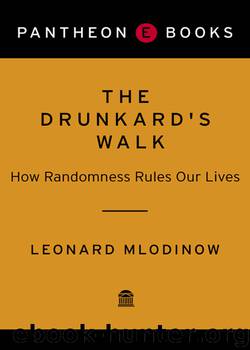The Drunkard's Walk by Leonard Mlodinow

Author:Leonard Mlodinow
Language: eng
Format: epub, mobi
ISBN: 9780307377548
Publisher: Knopf Doubleday Publishing Group
Published: 2008-05-12T16:00:00+00:00
THOUGH CONDITIONAL PROBABILITY represented a revolution in ideas about randomness, Thomas Bayes was no revolutionary, and his work languished unattended despite its publication in the prestigious Philosophical Transactions in 1764. And so it fell to another man, the French scientist and mathematician Pierre-Simon de Laplace, to bring Bayes’s ideas to scientists’ attention and fulfill the goal of revealing to the world how the probabilities that underlie real-world situations could be inferred from the outcomes we observe.
You may remember that Bernoulli’s golden theorem will tell you before you conduct a series of coin tosses how certain you can be, if the coin is fair, that you will observe some given outcome. You may also remember that it will not tell you after you’ve made a given series of tosses the chances that the coin was a fair one. Along the same lines, if you know that the chances that an eighty-five-year-old will survive to ninety are 50/50, the golden theorem tells you the probability that half the eighty-five-year-olds in a group of 1,000 will die in the next five years, but if half the people in some group died in the five years after their eighty-fifth birthday, it cannot tell you how likely it is that the underlying chances of survival for the people in that group were 50/50. Or if Ford knows that 1 in 100 of its automobiles has a defective transmission, the golden theorem can tell Ford the chances that, in a batch of 1,000 autos, 10 or more of the transmissions will be defective, but if Ford finds 10 defective transmissions in a sample of 1,000 autos, it does not tell the automaker the likelihood that the average number of defective transmissions is 1 in 100. In these cases it is the latter scenario that is more often useful in life: outside situations involving gambling, we are not normally provided with theoretical knowledge of the odds but rather must estimate them after making a series of observations. Scientists, too, find themselves in this position: they do not generally seek to know, given the value of a physical quantity, the probability that a measurement will come out one way or another but instead seek to discern the true value of a physical quantity, given a set of measurements.
I have stressed this distinction because it is an important one. It defines the fundamental difference between probability and statistics: the former concerns predictions based on fixed probabilities; the latter concerns the inference of those probabilities based on observed data.
It is the latter set of issues that was addressed by Laplace. He was not aware of Bayes’s theory and therefore had to reinvent it. As he framed it, the issue was this: given a series of measurements, what is the best guess you can make of the true value of the measured quantity, and what are the chances that this guess will be “near” the true value, however demanding you are in your definition of near?
Laplace’s analysis began with a paper in 1774 but spread over four decades.
Download
This site does not store any files on its server. We only index and link to content provided by other sites. Please contact the content providers to delete copyright contents if any and email us, we'll remove relevant links or contents immediately.
| Biomathematics | Differential Equations |
| Game Theory | Graph Theory |
| Linear Programming | Probability & Statistics |
| Statistics | Stochastic Modeling |
| Vector Analysis |
Modelling of Convective Heat and Mass Transfer in Rotating Flows by Igor V. Shevchuk(6440)
Weapons of Math Destruction by Cathy O'Neil(6280)
Factfulness: Ten Reasons We're Wrong About the World – and Why Things Are Better Than You Think by Hans Rosling(4742)
A Mind For Numbers: How to Excel at Math and Science (Even If You Flunked Algebra) by Barbara Oakley(3307)
Descartes' Error by Antonio Damasio(3279)
Factfulness_Ten Reasons We're Wrong About the World_and Why Things Are Better Than You Think by Hans Rosling(3237)
TCP IP by Todd Lammle(3185)
Fooled by Randomness: The Hidden Role of Chance in Life and in the Markets by Nassim Nicholas Taleb(3124)
The Tyranny of Metrics by Jerry Z. Muller(3073)
Applied Predictive Modeling by Max Kuhn & Kjell Johnson(3071)
The Book of Numbers by Peter Bentley(2968)
The Great Unknown by Marcus du Sautoy(2695)
Once Upon an Algorithm by Martin Erwig(2649)
Easy Algebra Step-by-Step by Sandra Luna McCune(2636)
Lady Luck by Kristen Ashley(2582)
Police Exams Prep 2018-2019 by Kaplan Test Prep(2549)
Practical Guide To Principal Component Methods in R (Multivariate Analysis Book 2) by Alboukadel Kassambara(2544)
All Things Reconsidered by Bill Thompson III(2393)
Linear Time-Invariant Systems, Behaviors and Modules by Ulrich Oberst & Martin Scheicher & Ingrid Scheicher(2371)
